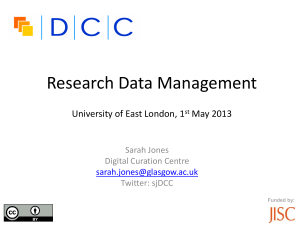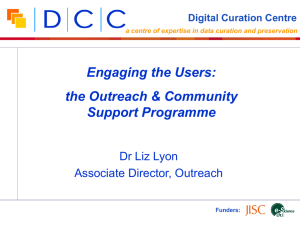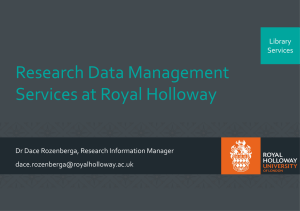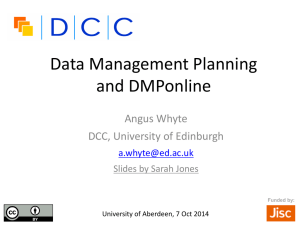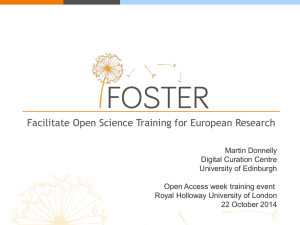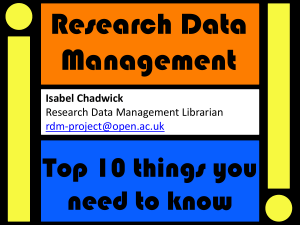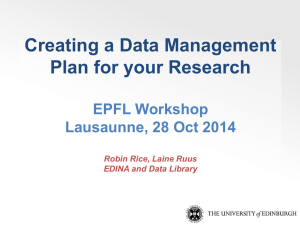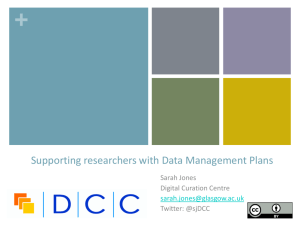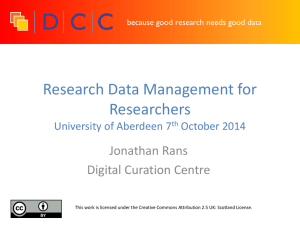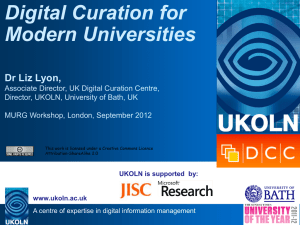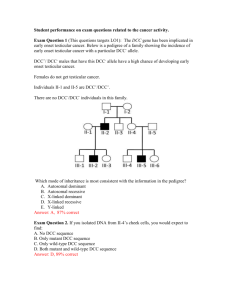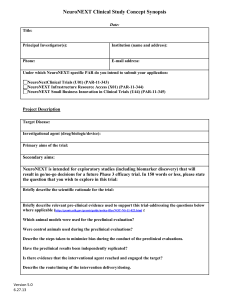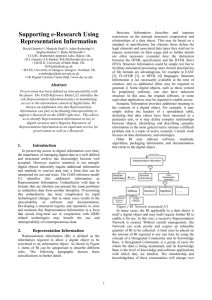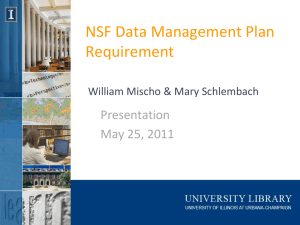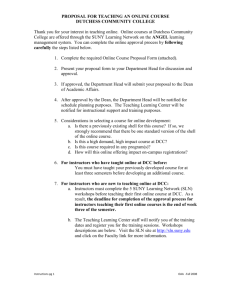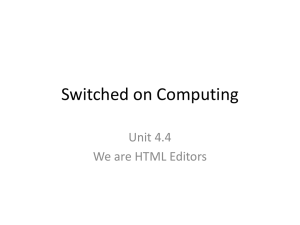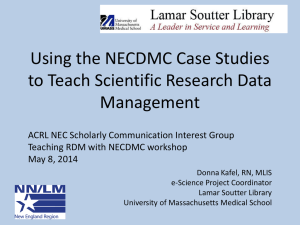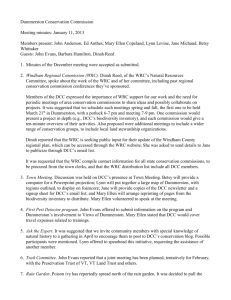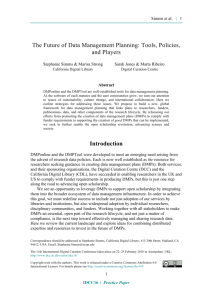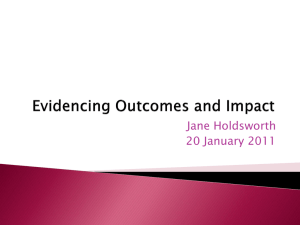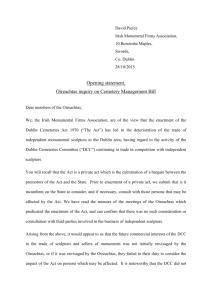DMP test - Loughborough University
advertisement
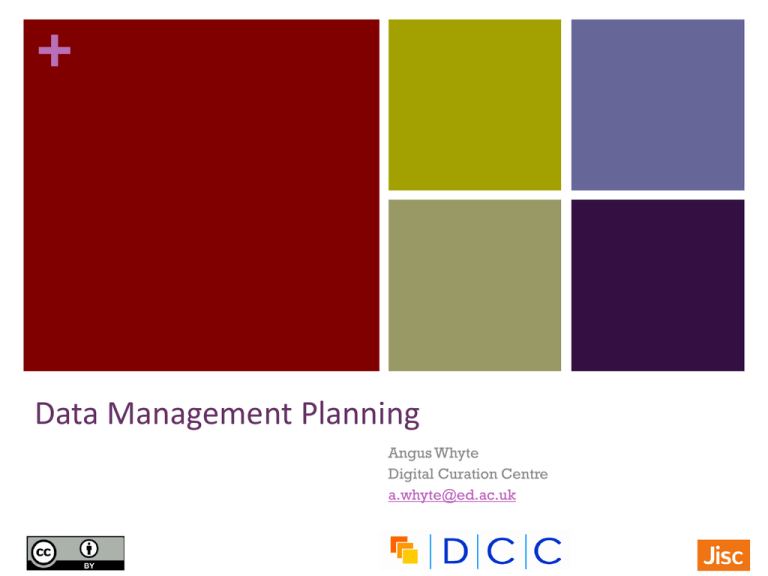
+ Data Management Planning Angus Whyte Digital Curation Centre a.whyte@ed.ac.uk + What is a DMP? Why are they important? What do funders require? What are risks of not doing it? What is good practice? Wkat kinds of support? The Digital Curation Centre + Consortium of 3 units in Universities of Bath (UKOLN), Edinburgh (DCC Centre) and Glasgow (HATII) Funded • by JISC, plus HEFCE funding from 2011 challenges in digital curation across institutions or disciplines support to JISC e.g. MRD targeted institutional development • Including Loughborough University • • • DCC Mission + “Helping to build capacity, capability and skills in data management and curation across the UK’s higher education research community” DCC Phase 3 Business Plan + 5 What is Research Data Management? Caring for, facilitating access Preserving and Adding value to research data throughout its lifecycle. Organisation, Resources and Technology required to support and sustain. + What is a Data Management Plan? A brief plan written at the start of a project to define: What data will be collected or created How the data will be documented and described How legal and ethical requirements will be addressed Where the data will be stored, its security and backup Which data will be shared and/or preserved How the data will be shared and with whom + Why do it? University wants it to happen Funders want you to do it! “Institutional and project specific data management policies and plans should be in accordance with relevant standards and community best practice…” RCUK Data Policy http://www.rcuk.ac.uk/research/Pages/DataPolicy.aspx + And..? The Government want you to share data ! “i. To the greatest extent and with the fewest constraints possible publicly funded scientific research data should be open, while at the same time respecting concerns in relation to privacy, safety, security and commercial interests, whilst acknowledging the legitimate concerns of private partners. ii. Open scientific research data should be easily discoverable, accessible, assessable, intelligible, useable, and wherever possible interoperable to specific quality standards” G8 Science Ministers Statement- June 2013 + And..? Learned societies want you to! “The modern data-rich environment for research and learning and the open culture that is needed to exploit it presents new challenges for Universities… 1 creating a setting that will encourage researchers to adapt their ways of working and developing, and 2 implementing strategies to manage the knowledge that they create.” Science as an open enterprise - The Royal Society 2012 p.71 + But what use is it? Planning is useful whether or not the DMP needs submitted with a grant application, as it can help you to… 1 Make informed decisions to anticipate and avoid problems 2 Avoid duplication, data loss and security breaches 3 Develop procedures early on for consistency 4 Ensure data are accurate, complete, reliable and secure 5 Save time and effort to make your life easier! + Which funders require a DMP? n.b. EPSRC does not require DMPs submitted but expects them to be done www.dcc.ac.uk/resources/policy-and-legal/ overview-funders-data-policies + What do research funders want? A brief plan submitted in grant applications, and in the case of NERC, a more detailed plan once funded 1-3 sides of A4 as attachment or a section in Je-S form Typically An a prose statement covering suggested themes outline of data management and sharing plans, justifying decisions and any limitations + What are the risks of not doing it? Bids with technical ambitions that can’t be delivered on Legal non-compliance DPA, FOI…etc. Inability to scrutinise –> damage to research integrity, reputation, retractions Loss of data or (re)usability Research outputs lack visibility Public communication diminished Potential loss of research income Loss- of reputation, research record, value and ££ + Guidance, tools & examples + Follow guidance from funders e.g. MRC audio clip on what to include in plans http://www.youtube.com/watch?v=ukVHHKp6sck Wellcome Trust FAQ http://www.wellcome.ac.uk/About-us/Policy/Spotlightissues/Data-sharing/Guidance-for-researchers/index.htm ESRC guidance for peer-reviewers http://www.esrc.ac.uk/_images/Data-Management-PlanGuidance-for-peer-reviewers_tcm8-15569.pdf + Six common themes to address 1. Description of data to be collected / created (i.e. content, type, format, volume, standards...) 2. Documentation and metadata (what, how, why… ) 3. Ethics and legal compliance (e.g. consent, privacy, confidential data, copyright and IPR) 4. Storage and backup (how & when, security mgmt) 5. Selection and preservation (what retained and how preserved) 6. Data sharing (how, when, limits) + A useful framework to get started Brief explanations of questions Sample statements www.icpsr.umich.edu/icpsrweb/content/datamanagement/dmp/framework.html + Help from the DCC https://dmponline.dcc.ac.uk www.dcc.ac.uk/resources/ how-guides/develop-data-plan + DMPonline – Creating a plan Select your funder (if any) Select relevant uni for DMP questions and guidance Select other sources of guidance + DMPonline – Questions and guidance Easy-format text boxes to answer Can pre-populate boxes with example / suggested answers Guidance appears in right-hand panel + Example plans Technical appendix submitted to AHRC by Bristol Uni http://data.bris.ac.uk/files/2013/02/data.bris-AHRC-Technical-Plan-v21.pdf Rural Economy & Land Use (RELU) programme examples http://relu.data-archive.ac.uk/data-sharing/planning/examples UCSD example DMPs (20+ scientific plans for NSF) http://rci.ucsd.edu/dmp/examples.html U.Michigan Engineering example and tutorial https://sites.google.com/a/umn.edu/data-management-workshop-series2013/module7 My DMP – a satire (what not to write!) http://ivory.idyll.org/blog/data-management.html + Restrictions on sharing The data will be deposited with [repository] but not disseminated for one year to give the investigators time to publish their findings. [1] Any design notes on the data analysis are in our private e-mail, and we will fight to the death - up to and including ignoring FOI requests - to prevent you from obtaining them. [2] [1] ICPSR Framework for Creating a Data Management Plan [2] My DMP – a satire, by C. Titus Brown + Basic tips Keep it simple, short and specific Seek advice - consult and collaborate Base plans on available skills and support Make sure implementation is feasible Justify any resources or restrictions needed http://www.youtube.com/watch?v=7OJtiA53-Fk + What policy changes expected? EU Horizon2020 Research Sector Transparency Board considering policy action re Open Data + Horizon2020 “All project proposals submitted to "Research and Innovation actions" as well as "Innovation actions" include a section on research data management which is evaluated under the criterion 'Impact'. Where relevant, applicants must provide a short, general outline of their policy for data management, including the following issues: What types of data will the project generate/collect? What standards will be used? How will this data be exploited and/or shared/made accessible for verification and re-use? If data cannot be made available, explain why. How will this data be curated and preserved? Guidelines on Data Management in Horizon 2020 + Research Sector Transparency Board + Research Sector Transparency Board Huge amounts of government data becoming available for research Adding to the need for planning and support + http://www.adls.ac.uk/ + Thanks – any questions? DCC guidance, tools and case studies: www.dcc.ac.uk/resources Follow us on twitter: @digitalcuration and #ukdcc
